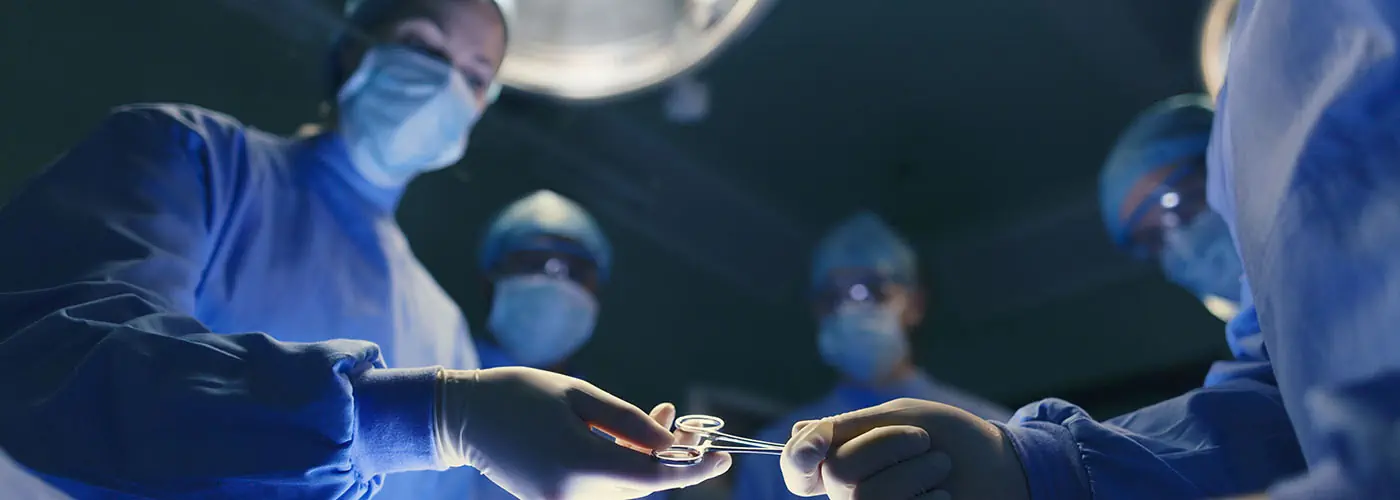Minimally Invasive and Open Surgical Procedures by Expert Surgeons

General surgeons have a wide range of knowledge and skills to manage various surgical emergency and elective procedures, ensuring comprehensive care for every patient.
At Gleneagles Hospitals, the team of surgeons specialises in both minimally invasive and open surgical procedures across various subspecialties such as colorectal surgery, gastrointestinal surgery, breast surgery, endocrine surgery, and vascular surgery.
Types of General Surgery Procedures at Gleneagles Hospitals
Common vascular surgery includes:
- Angioplasty / stenting: Insertion of a balloon or stent to widen narrowed arteries and improve blood flow
- Endovenous laser treatmentTreatment of varicose veins via ultrasound
Treatment of the liver and biliary system includes:
- Removal of gallstones or the entire gallbladder
- Removal of tumours such as haemangioma and focal nodular hyperplasia
- Treatment and/or removal of fluid-filled cysts in the liver
- Treatment of pancreatic cancer
For benign and/or even malignant conditions may include the procedures listed below:
- Lumpectomy: Removal of breast lumps and surrounding tissues while maintaining the natural appearance of the breast. This procedure is usually advised if an early biopsy shows early stages of breast cancer with a small tumour or even for the removal of non-malignant abnormalities.
- Mastectomy:Complete removal of the entire breast(s), especially for those with multiple or large areas of ductal carcinoma. This procedure may also be recommended to reduce the possibility of breast cancer recurrence.
- Breast augmentation: Performed to enhance the appearance of a woman's breast via implants over or under the pectoralis chest muscles.
- Breast reduction: Performed to reduce the volume and contour while preserving breast sensation and function. This includes the removal of excess skin, fat and glandular tissue which may benefit those afflicted by neck and back pains and skin irritations.
- Breast reconstruction: Recreate breasts with the desired appearance, volume and contour via implants using the patient's own tissue.
To diagnose and treat patients with bowel and associated conditions such as colorectal cancers, ulcerative colitis, diverticular disease, Crohn’s disease, and a wide range of benign anorectal conditions, including haemorrhoids and anal fissures.
Some of these surgeries include:
- Haemorrhoidectomy: Removal of distended veins in the lower parts of the rectum and/or anus. Other methods may include lasers, stapling or rubber banding
- Partial colectomy: Excision of parts of the colon to treat colon cancer and long-term ulcerative colitis
Gastrointestinal surgery is a treatment for conditions that affect the organs that form the digestive organs. Conditions that may be treated with surgery:
Conditions that may be treated with surgery:
- Oesophageal diseases - reflux oesophagitis, oesophageal obstructions, hiatal hernia, and oesophageal cancers
- Hepatobiliary (liver) disease - benign and malignant diseases of the biliary tract and liver, jaundice, pancreatitis and cholelithiasis
- Gastroduodenal diseases - reflux problems, gastric and/or duodenal ulcers and cancers
Head and neck surgery concerns the diagnosis and treatment of diseases located in the head and neck.
Common surgeries include:
- Tonsillectomy: Surgical removal of one or both tonsils to manage and/or treat tonsillitis.
- Endoscopic sinus surgery
- Examination of sinus openingsfor obstructions and/or unusual growths, which are then removed.
- Uvulopalatopharyngoplasty: Removal of excess tissue from the back of the throat, helping with sleep apnoea.
- Thyroidectomy: Removal of the thyroid gland.
What to Expect When You Visit a General Surgeon
Each treatment plan will be tailored according to the needs of the patient. However, your visit to the general surgeon will probably include an evaluation to ensure surgery is the best option for you.
The surgeon will also explain the procedure and help you to prepare for the surgery. This may include:
- Other tests that you may need to take before the operation
- Whether you need to stop any medications
- Whether you need to fast before the procedure.
- Post-surgical management
The surgeon will also let you know how long you will need to stay at the hospital. Additionally, you will also be able to ask any questions you have about the surgery.
Gleneagles Hospitals Surgical Facilities
Here at Gleneagles, we are committed to keeping you safe and achieving the best results during your surgery. We aim to ensure that the most effective surgical methods are used to put you on the fast track to recovery and rehabilitation. Our advanced technologies aim to diagnose and treat each patient’s condition for the best possible outcome while minimising side effects and reducing recovery time.
We believe each patient is unique with their own specific expectations and requirements. The team of dedicated and experienced surgeons at Gleneagles Hospitals ensure this via a planned discussion and guided counsel through the most crucial areas concerning treatment.
Expert Surgeons and Specialists at Gleneagles Hospitals
The team of expert surgeons and specialists at Gleneagles Hospitals is dedicated to providing personalised, high-quality care using advanced surgical techniques. Schedule a consultation today to receive the best treatment tailored to your needs.


